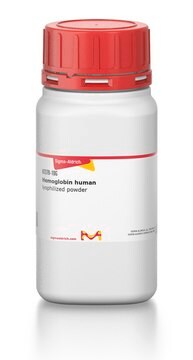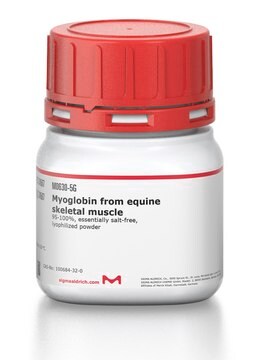H4131
Hemoglobin porcine
lyophilized powder
Synonym(s):
Hb
Sign Into View Organizational & Contract Pricing
All Photos(1)
About This Item
Recommended Products
biological source
Porcine
Quality Level
form
lyophilized powder
solubility
H2O: soluble 10 mg/mL
storage temp.
2-8°C
Gene Information
pig ... HBB(407066) , HBE1(407067)
General description
Hemoglobin is the major component of red blood cells, and is responsible for their red color. Its normal concentration in erythrocytes is 34%. Hemoglobin is the most important respiratory protein of vertebrates by virtue of its ability to transport oxygen from the lungs to body tissues, and to facilitate the return transport of carbon dioxide.
Application
Hemoglobin from porcine was used to test the role of the L-arginine/nitric oxide pathway in relaxation of isolated human penile cavernous tissue and circumflex veins. It was also used to study the role of nitric oxide in neurogenic vasodilation of porcine cerebral artery.
Biochem/physiol Actions
The Fe2+/Fe3+ balance is a physiological indicator of blood oxygenation. Deoxygenated hemoglobin accessorizes a feedback loop by reducing nitrite to NO, a vasodilator which enhances blood flow to oxygen-deprived tissues.
Oxygen transporter, NO scavenger
Caution
Since native hemoglobin is readily oxidized in air, these preparations may be predominantly methemoglobin.
Storage Class
11 - Combustible Solids
wgk_germany
WGK 3
flash_point_f
Not applicable
flash_point_c
Not applicable
ppe
Eyeshields, Gloves, type N95 (US)
Certificates of Analysis (COA)
Search for Certificates of Analysis (COA) by entering the products Lot/Batch Number. Lot and Batch Numbers can be found on a product’s label following the words ‘Lot’ or ‘Batch’.
Already Own This Product?
Find documentation for the products that you have recently purchased in the Document Library.
Customers Also Viewed
F Y Chen et al.
The Journal of pharmacology and experimental therapeutics, 265(1), 339-345 (1993-04-01)
A superfusion bioassay cascade, with porcine pial arteries as donor tissues and rabbit aortic rings as detector tissues, was used to examine the role of nitric oxide (NO) in cerebral nonadrenergic, noncholinergic neurogenic vasodilation. All arteries were mechanically denuded of
H J Kirkeby et al.
Acta physiologica Scandinavica, 149(3), 385-392 (1993-11-01)
In human penile corpus cavernosum strips, pre-contracted by noradrenaline, electrical stimulation of nerves evoked non-adrenergic, non-cholinergic (NANC) relaxant responses which could be inhibited by tetrodotoxin 10(-6) M, NG-nitro-L-arginine (L-NNA) 10(-7)-10(-4) M, and oxyhaemoglobin 10(-5) M, but not by methylene blue
Vladimir M Turzhitsky et al.
Applied optics, 47(32), 6046-6057 (2008-11-13)
There has been significant interest in developing depth-selective optical interrogation of biological tissue in general and of superficial (e.g., mucosal) tissue in particular. We report an in vivo polarization-gating fiber-optic probe that obtains backscattering spectroscopic measurements from a range of
Xingyi Jiang et al.
Foods (Basel, Switzerland), 10(8) (2021-08-28)
Different types of enzyme-linked immunosorbent assays (ELISA) have been widely used to control food safety and quality. To develop an accurate and reproducible ELISA, false immunodetection results caused by non-specific binding (NSB) and cross-reaction must be prevented. During the case
Chung-Chieh Yu et al.
Optics express, 16(20), 16227-16239 (2008-10-01)
We report a fully quantitative spectroscopy imaging instrument for wide area detection of early cancer (dysplasia). This instrument provides quantitative maps of tissue biochemistry and morphology, making it a potentially powerful surveillance tool for objective early cancer detection. We describe
Our team of scientists has experience in all areas of research including Life Science, Material Science, Chemical Synthesis, Chromatography, Analytical and many others.
Contact Technical Service










